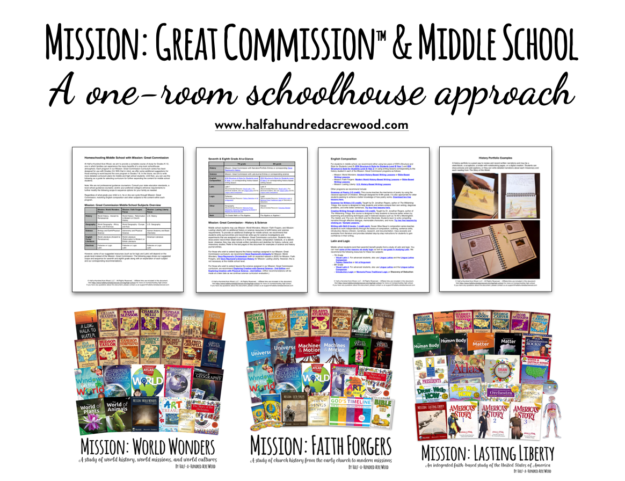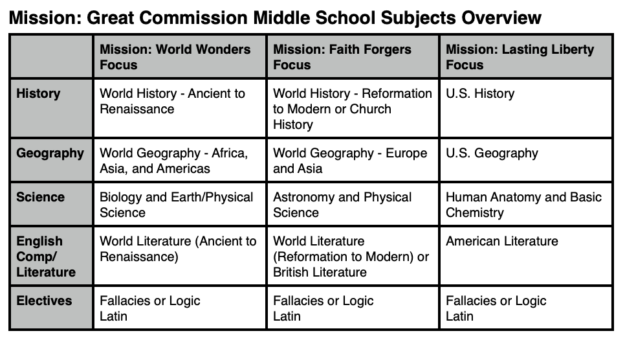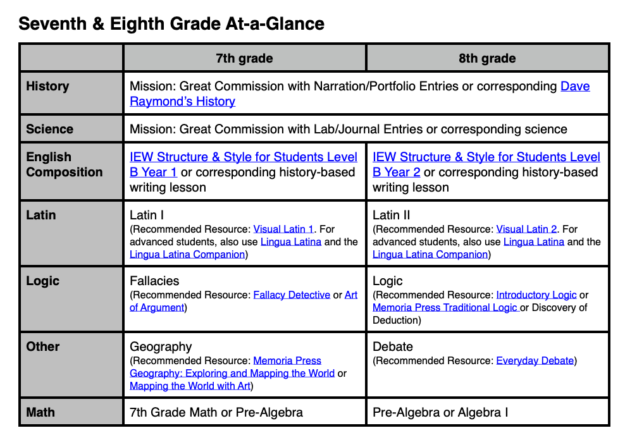
Sometimes it seems this calling – our vision and desire to help other homeschool families – far exceeds our capabilities. It’s funny how we can so easily default to trusting in ourselves as we pursue God’s call. We’re forced to remember that God is greater. Philippians 4:13. I’m thankful for grace.
In the coming years, our family hopes to provide a complete course of study for Grades K-12, one in which families can experience the many benefits of a one-room schoolhouse atmosphere. One of the challenges we’ve faced this year is living out this calling in the midst of our other calling – the one that involves our own everyday lives as real, bona fide homeschool parents with a senior graduating next month and a first grader still struggling to read. Not to mention, the water pressure in our house suddenly dropped and the freezer stopped working correctly and… what is that smell, anyway?
Suddenly it dawns on me that next year there will only be three boys gathering around the homeschool table. Homeschooling our oldest to graduation has been one of the most precious gifts I’ve ever been granted. (It was paralyzing to switch gears three years ago, but it’s been so good.) Could I have just one more year with him?
It’s hard but it’s exciting, the very definition of bittersweet in my heart. Every little thing we do now is a reminder of how short-lived this calling really is. Thank you, Lord, for such grace – and for such blessing!
Well, I have no idea why I wrote all that. Maybe someone else out there is also just taking the next step. That’s where I am, and I’m thankful for those who take the next step alongside us on this homeschool journey!
The Next Step in Mission: Great Commission
We’ve received many questions about middle and high school plans, but we’re still not sure when those will be ready. However, as we’ve been in super-duper curriculum evaluation mode, we have updated our recommendations for high school and have finally pulled together some recommendations for middle school!
If you’re new to our Mission: Great Commission Curriculum, this series takes families through a study of the entire world over a three-year period, with Mission: World Wonders exploring ancient to medieval history along with world cultures, religions, and missions, Mission: Faith Forgers providing an overview of church history in the midst of world history from the protestant reformation through modern times, and Mission: Lasting Liberty focusing on the history of the United States of America. This missions-focused curriculum explores social studies and science while integrating the study of scripture, history, geography, missions, hymns, and fine arts for Grades 2-8.
Although each program has been designed for use with Grades 2-8, we offer some additional suggestions for those wishing to work beyond the core program in 7th and 8th grade. In the future, we aim to write more detailed curriculum plans for middle and high school students. Until then, you can use the following as a guide for selecting curriculum for further expanding the content for middle school students.
Regardless of what grade your child is in, he or she can cycle through Mission: Great Commission, matching English composition and other subjects to the content within each program.

However, some of our suggested resources for certain subjects (such as logic and Latin) will depend on the grade level instead of the content in Mission: Great Commission. Below is our suggested scope and sequence for seventh and eighth grade along with an explanation of each subject and our corresponding recommendations.

English Composition
For students in middle school, we recommend either using two years of IEW’s Structure and Style for Students Level B (IEW Structure & Style for Students Level B Year 1 and IEW Structure & Style for Students Level B Year 2 – you can try out three weeks for free here.) or using writing lessons corresponding to the history studied in each of the Mission: Great Commission programs as follows:
- Mission: World Wonders: Ancient History-Based Writing Lessons or Bible-Based Writing Lessons
- Mission: Faith Forgers: Modern World History-Based Writing Lessons or Bible-Based Writing Lessons
- Mission: Lasting Liberty: U.S. History-Based Writing Lessons
Other programs we recommend include:
Teaching the Classics (for the parent – for literature discussion). Instead of using regular comprehension literature guides, our family’s literature discussions follow the Teaching the Classics Approach. (We highly recommend Teaching the Classics for parents to learn how to discuss literature with their children from preschool to adult!) Students can fill out a story chart for each work of literature while also practicing the art of narration. Use code REF6CA9VNCSMT to receive 15% off your first order of $100.
Grammar of Poetry (1/2 credit).* This course teaches the mechanics of poetry by using the classical approach of imitation. Although designed for 6-9th grade, it is also appropriate for older students seeking to achieve a better knowledge of how poetry works. Download two free lessons here by clicking on “Try Sample Lessons.”
Grammar for Writers (1/2 credit).* Taught by Jonathan Rogers, author of The Wilderking Trilogy, this course is designed to help students and writers analyze their own writing, diagnose problems, and write better sentences. Try four free lessons here.
Creative Writing through Literature (1/2 credit). Taught by Dr. Jonathan Rogers, author of The Wilderking Trilogy, this course is designed to help students to become better writers by examining and practicing techniques used in beloved classics such as To Kill a Mockingbird, The Hobbit, and The Lion, the Witch and the Wardrobe. Students learn to write compelling narrative through effective dialogue, memorable characters, and more. Try two free lessons by clicking on “Sample Lessons.”
Writing with Skill (3 levels; 1 credit each). Susan Wise Bauer’s composition series teaches students to work independently through the basics of composition, outlining, sentence skills, introductory literary criticism, narratives, research, and documentation. Uses excerpts and examples from literature and provides detailed step-by-step instructions for students to gain confidence in their writing.
Latin and Logic
Middle school students (and their parents!) benefit greatly from a study of Latin and logic. You can read some of the reasons we study logic as well as our goals in studying Latin. You can read some of the reasons we study logic as well as our goals in studying Latin. Our family’s goal is to provide a solid foundation in Latin in the middle school years so that in high school we can proceed with either advanced classical studies in Latin/Greek or a foreign language. As a two year program, Visual Latin provides us with the opportunity to tackle Latin in middle school so that we have more flexibility in high school. We recommend the following resources for these two subjects:
- 7th Grade
- Visual Latin 1. For advanced students, also use Lingua Latina and the Lingua Latina Companion
- Fallacy Detective and/or Art of Argument
- 8th Grade
- Visual Latin 2. For advanced students, also use Lingua Latina and the Lingua Latina Companion
- Introductory Logic or Memoria Press Traditional Logic or Discovery of Deduction
If you’re not sure you want to study Latin, be sure to check out Word Up! which is a great vocabulary program that teaches over 600 words based on Latin and Greek roots.
Other – Geography
Students who complete the Mission: Great Commission curriculum series will memorize all the countries of the world along with physical features from each continent and states and capitals of the USA. If you would like to memorize how to draw the world freehand, you can do so by tracing maps daily using our Map Tracing Guide, eventually setting aside the map to see how much you can draw freehand. If you would like an additional resource to extend this knowledge, we recommend Memoria Press Geography: Exploring and Mapping the World for memorizing additional features and country capitals or Mapping the World with Art for a course in cartography that focuses on the art of map-making instead of political boundaries of countries.
Other – Debate
Debate is a fantastic skill to introduce in the middle school years. We recommend Everyday Debate from Classical Academic Press.
Math
Also add a math program of your choice to complete required coursework. We use Math U See. We switched everyone to Math U See in our home a few years ago which has resulted in the best outcome of any option we have used in the past – for all of our children! Most math programs implement either too few math problems or too many. This program has a good balance, and it’s the only math course our three oldest sons have enjoyed. Also, starting Math U See PreAlgebra in 7th grade provides the opportunity to complete math through Calculus I in high school. And if you feel a sense of foreboding as you step through high school level math, the videos can provide the instruction for your student.
Mission: Great Commission – History & Science
Middle school students may use Mission: World Wonders, Mission: Faith Forgers, and Mission: Lasting Liberty with no additional history or science resources to fulfill history and science requirements. To provide an additional challenge for middle school, we recommend that students write journal entries and record lab write-ups for science investigations and experiments that are assigned in our Mission: Great Commission curriculum. Students may draw and/or record their observations in a three-ring binder, composition notebook, or a sketch book. Likewise, they may also include written narrations and sketches for history, cultural, and missionary studies.
For those who wish to extend beyond the history readings assigned in our Mission: Great Commission curriculum, we recommend Dave Raymond’s Antiquity for Mission: World Wonders, Dave Raymond’s Christendom or Dave Raymond’s Modernity for Mission: Faith Forgers (or specifically for a more advanced church history, How Jesus Built His Church), and Dave Raymond’s American History or Dave Raymond’s Modernity for Mission: Lasting Liberty (or the textbook-based course American Faith.) However, this is not necessary at the middle school level. If you also have a high school student, you can encourage Socratic discussion as a family by watching the lessons and discussing the questions together.
For those who wish to extend beyond the history readings assigned in our Mission: Great Commission curriculum, we recommend Dave Raymond’s Antiquity for Mission: World Wonders, How Jesus Built His Church or Dave Raymond’s Christendom (or Dave Raymond’s Modernity) for Mission: Faith Forgers, and American Faith or Dave Raymond’s American History for Mission: Lasting Liberty. However, this is not necessary at the middle school level. If you also have a high school student, you can encourage Socratic discussion as a family by watching the lessons and discussing the questions together. (Note that Dave Raymond’s Antiquity, Christendom, and Modernity may be too advanced for middle school students.)
For those who wish to extend beyond the science assigned in our Mission: Great Commission curriculum, we recommend Exploring Creation with General Science and Exploring Creation with Physical Science or Earth Science Explored (Mission World Wonders), Physical Science Explored or Experience Astronomy (Mission Faith Forgers), or God Made Life (Mission Lasting Liberty).
So… there you have it! If you’d like to download a printable pdf of this information, just click here or on the button below!
We look forward to studying the ongoing fulfillment of the Great Commission alongside your family! If you have any questions, feel free to contact us at support@halfahundredacrewood.com.

